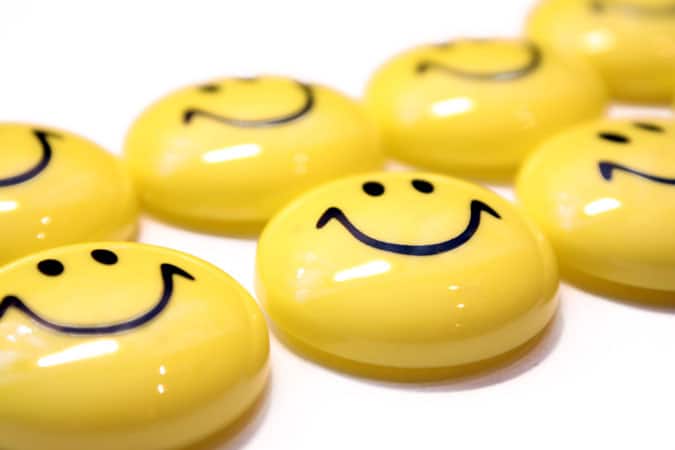Since I was young, I can remember being rejected thousands of times. Romantically, in friendship, business wise and creatively. Most of these times I have been the rejector and rejectee. I have rejected myself far more than others. So much so, when I was a teenager, I never asked a girl out or had the balls to try anything in that sense. It was only in college that I began to gain enough confidence to do so. But, back then, I felt badly enough about myself I was scared that external rejection would confirm my worst fears: that I simply wasn’t enough.
The easiest thing in the world today is to feel not enough. All around us we are presented with the possibilities that we could have but do not have. ‘FOMO’ or Fear of Missing Out means that even if we can do something, because we have to choose things, we can always feel disappointed and regret. Decision fatigue or the exhaustion that we have with decisions is very real because we fear making the wrong decision no matter how unimportant the decision might be. When it comes to ourselves, there is so much more we could do, be or have that we don’t. The grass is always greener concept means that we are forever destined to know that we will never have, do or be enough.
That begs the question, what is enough? Stefanie Preissner is an extremely talented screenwriter, author, playwright and actor who is extremely popular in Ireland at present and deservedly so. Her first television series ‘Can’t Cope Won’t Cope’ did extremely well and was excellently written. Seen as one of the emerging talents in our country, Stefanie wrote a brilliant piece in last week’s Sunday Independent. Tailored mainly at the leaving certificate students (our high school exam), she discussed how she is introduced and how impressive that can seem in contrast to the fuller truth which includes her flaws. She proceeds to explain many examples of said flaws. This really struck a chord with me.
Far too often, we immerse ourselves within the mindset of surface level thinking. We see a photo on Instagram and we project a life onto the people we see. It is so easy to see everyone else as living happier and more successfully than us. A few months ago, while teaching a seminar in Colombia I came up with a phrase that I like to use to describe what we need to do more: ‘Dig Deep Beneath the Snapshot’. By this I mean that it is important that we continuously remember what we compare ourselves to is not the full picture. Stephanie’s flaws or my flaws do not appear when we are presented most of the time in public. It is not how the world works, understandably. Instead, we market ourselves (or our agents do it for us) to the world to get people to focus attention on our accolades and experience. We want them to be impressed so they will buy what we have to sell or watch what we have made.
When I do talks, teach seminars or write books, I know that there will be some people that love them and some that don’t. My job is based upon the idea that most will and so I have to make sure people know that.
Last week, I won a best actor award for a short film at the Chain NYC Film Festival. Since I first started writing and acting in short films, I have posted great news on the film festivals we have been accepted into. Though we were accepted into a few and have won a couple of awards, what I haven’t shared are the dozens of rejections from festivals which we received. I get every one of them in my email inbox and they never stop stinging, but it is part of the game. An acting teacher I had once explained that when you get turned down for a part it often says nothing about your talent but more about your ‘look’ or how the casting director sees you as fitting into the project. The reality is that greatest actors have been rejected many, many times. It comes with the territory. But we do not often see these rejections. Instead, we see their success. Their Oscar winning speeches. The fruits of their labour. Sure, we hear the stories, but we focus our attention on what we can see now.
This happens in the business world as well. We start a business, inspired by Facebook, Google, LinkedIn or Paypal. We soon realise that there is so much more to succeeding than what we were aware of. Or the romantic world, the romantic movie. The friends we know madly in love with their perfect partner and yet dating can often seem like some sort of special hell designed to break us down. Rejection is plentiful on both sides in the quest for a perfect partner. So, why can’t things just work like they are supposed to?
The answer that stings more than anything is that maybe it does work like that, for others. Maybe, just maybe, we are not enough. We are not good enough to be with the person who we have a crush on. Maybe we are not tall enough, attractive enough, smart enough, funny enough, interesting enough or confident enough. Maybe we are not business savvy enough to succeed in business. Maybe we are not creatively talented enough to succeed in the industry. We question and question and question ourselves with that bitter old bastard self-doubt. We try to understand, are we enough? And we miss the biggest mistakes of all.
We fail to see that asking are we enough or are we good enough contains a flawed assumption. That there is such thing as enough. The reality is that enough tends to suggest that there is a certain criteria attached. For example, if you run enough miles in a row then you will have succeeded in running a marathon. If you sell enough water filters, then you will make enough money in your job. If you get enough Facebook followers, then you can become an influencer. These are metrics that we can accurately use the term ‘enough’ with. Our mistake is that we use the term far more subjectively. We use it in a way that enables our negative inner voices to determine the rules.
For example, you meet someone, like them, ask them out, they say no and you think to yourself ‘I’m not good enough for them’. But it’s possible that a) they said no to you because they don’t feel good enough for you b) they feel too good for you because they suffer from an arrogant set of delusions which preserves their sense of self despite the fact that deep down they feel lesser than you or c) they don’t feel chemistry with you that would position you as having potential in the romantic arena. There is actually no way for you to prove that you are not good enough for them because that begs the question in what way. There will always be things you do or qualities you have ‘better’ than them and vice versa.
You write a book and a publisher rejects it. You tell yourself ‘I’m not a good enough writer’. But it’s possible that a) the publisher isn’t looking for your style of book now b) they don’t resonate with your writing because of their own preferences or c) they’re an idiot with no taste. Of course, maybe the book is not great but let me ask you a question: Have you ever read a book published by a publisher that was rubbish? Of course, so just because something is or isn’t published cannot be seen as a definite statement of whether it is good enough. I’m not nearly as good a writer as I want to be but I am getting better. I’m enough and my writing is improving. Rejections like these are not about reaching a target. They are about a person’s perception.
The girl or guy who rejected you may well end up with someone way worse for them. The publisher may end up with a far less popular book than yours. The customer may well end up with an inadequate product. It does not matter what the context is. You will never know if you are ‘good enough’ unless you have specific measurable guidelines. Even when you do, the majority of times when someone else says something is not good enough they are talking about something external. What you have created or done not who you are. They talk about results not potential. The only time we really feel not good enough as people is when we tell ourselves that.
The trick to handling this is understanding that you are never your results. Your results are educators about how to improve and your success depends on your ability to continuously take feedback that comes from what you do and create and work as hard as you can to make it better. You are always enough even if what you do is not. But you can always improve what you do. A rejection from others is information that you can use to change what you do or information that you can use to accept that what you do or how you come across is not what they are looking for. You might not have the ‘look’, ‘personality’ or ‘bank balance’ for them. But that suggests they are not for you either. It is not about being ‘enough’. It is about learning what works for you and what is right for you.
Things will never work out as perfectly as we wish because we fail to dig deep beneath the snapshot and understand that behind greatest successes are many big failures, huge amounts of rejection and, in some cases, humiliation. When we remind ourselves that nothing is exactly as it seems and that even someone as talented as Stefanie Preissner can have bundles of flaws, it helps to give us a more useful perspective. The reason it is easy to feel not enough is because we have an internal script we play when we see people doing well. This comparison script rates and judges others around us to see where we fit in. Once we are aware of this, we can understand the importance of seeing these comparisons as being built out of a severe lack of information. You cannot compare yourself when you have years of biased (often negatively) expertise on to someone you barely know or even someone you know reasonably well. Instead, you can celebrate others success and let them inspire you.
Rejection still stings all these years later. But I am pretty used to it now and I am trying to get rejected more outside my head than inside. The rub is to acknowledge that any internal rejection is not some remarkably intelligent insight but is simply the product of negative internal thinking. The No on the outside hurts far less than the No on the inside. I have started to remind myself every day to be consciously aware of this and it is a battle I will continue to wage for good. Until I become enlightened enough-:)





